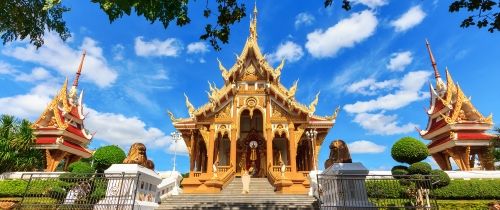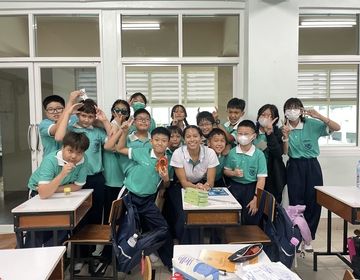
Diversity in Thailand
CIEE wants all our participants to feel welcomed, supported, and empowered to succeed while abroad. On this page, local staff have provided details about conditions and cultural attitudes that students with specific identities might encounter at their location.
The information below is just a broad overview so if you have specific questions or concerns not covered here, please email inclusion@ciee.org. We would be glad to have local staff share their perspectives, talk with you about accommodations, and connect you with resources.
BODY SIZE/IMAGE
Most Thai people are very particular about their personal health, or at least the visual representation of it. Those coming from the west will likely find most Thais to be much skinnier than the population from their home countries. This can be attributed to many factors including diet, emphasis on one’s physical appearance, and social stigma. The standard of beauty in Thailand can create social pressure where people devote considerable time to their physical appearance. Plastic surgery is very common in Thailand for this reason.
Thais will often be blunt with jokes or in conversation make light about each other’s physical appearances. Thais give nicknames to their friends, family or acquaintances that describe their physical appearance. In Thailand adjectives such as “fat”, “short”, or “heavy” are perceived to be descriptive words with neutral connotations. Many foreigners are taller and larger compared to the average Thai person and you can expect your body size to come up in conversation.
DISABILITY
Thailand lacks infrastructure for accommodating persons with physical disabilities. Even in larger and more modern cities basic needs such as wheelchair ramps or accessible sidewalks are absent or inadequate when available. People with physical handicaps will find it difficult to maneuver while living in Thailand outside of the larger cities. If you need a wheelchair to get around then many places in Thailand will be inaccessible to you.
Social perspective on people who are physically handicapped is also a bit different from the west. Being extra hospitable by nature, Thais often offer to help people who are physically handicapped, even often in situations where they didn’t need or didn’t ask for any assistance. The attitude of “if they’re physically handicapped, they need help” is quite common among Thais.
Mental health disorders do not receive much attention in Thailand. While medication can be found in most cases if the medicine is for a very rare or for a severe mental disorder it can be costly or only be available at select hospitals in the country.
There are psychiatric hospitals and doctors who specialize in mental health disorders in Thailand, however they are spread out and you may have to travel over a weekend to see one if they are not located in your specific town.
GENDER AND GENDER IDENTITY
Gender identity in Thailand can be confusing to foreigners coming from Western countries. In many ways society is more open and cares little for how you identify. Friends, family and strangers will typically mind their own business even if they might disagree with someone’s gender expression. In rural communities’ people who are transgender can be open without ramifications to themselves or their family.
However, when it comes to school and work (especially in government offices), people are expected to dress and act according to the gender expectations for their sex assigned at birth.
This can create a contrast between one’s personal and public image. While you can often find people who fully express their gender identity in everyday life, it is very rare to see certain gender identities being represented in the media, or in certain professions that involve public image.
HERITAGE SEEKERS
Thailand can be a wonderful place for those looking to connect with their Thai heritage.
Many teachers in the past came to Thailand to get back in touch with their roots. Some were members of tribal groups such as the Hmong who are now largely represented in the United States. Some may have extended family members in Thailand whom they have not met or know only through distant relatives.
It is important to understand that foreigners with Thai heritage will still be viewed as outsiders in Thailand. For example, Thai people will consider you an American if you were raised in the United States even if you have Thai heritage. Go into the experience with an open mind and be ready to learn.
Understand your own limitations when it comes to getting to know those in your community. If your family history is from a certain region or province in Thailand, understand that that location will have its own unique culture, traditions, and sometimes even language. For example, a bit of history will help you understand that historically not everyone has always gotten along. Many Hmong in the United States immigrated there because they had no choice due to war, discrimination, and displacement.
RACIAL AND ETHNIC IDENTITY
Thais can be extremely friendly but at times ignorant of those from other communities, countries, or groups. Thailand is relatively homogeneous with defined ethnic groups that have lived there for thousands of years. In larger cities people are used to seeing foreigners, but in smaller communities foreigners attract considerable interest. It is common for strangers to stare, or for complete strangers to say hello and introduce themselves. Thai people are generally friendly and curious about foreigners.
Social status has more bearing on identity in Thailand than race. However you may experience ignorance from those purely because they do not know any better or have no experience with people from your background.
In the past, skin color was seen as a sign of social status in Thailand. People with lighter skin often worked indoors in higher status jobs, while people with darker skin often worked outside in lower status jobs.
RELIGION
The vast majority of Thailand is Buddhist and Buddhist traditions and religious functions will be present in almost every aspect of Thai society. This will be present at schools, government functions or meetings and of course tourist hot spots. However, people who are of different religions are never forced to participate in religious activities.
It is important to note that in Thailand even though the majority of the country is Buddhist there are still other religions present including Hinduism, Christianity, Islam as well as a variety of tribal belief systems throughout the country. It is also important to note it is considered incredibly rude to belittle or mock someone’s faith, regardless of what it is. Making fun of other people’s religious beliefs can earn sharp criticism from locals.
Regardless of your personal beliefs, it is always good practice to show care and respect when entering another person’s holy space. For example, in Thailand Temples are open for all to visit and experience, however some rules must be observed. Removal of shoes in certain areas, no touching of monks, not pointing your feet at images of Buddha are all obvious and will be taught to you. Others however are important to note. Taking pictures of people praying at their local temple might be considered bad taste or being loud and disrespectful within the temple.
SEXUAL ORIENTATION
Thailand is a fairly friendly country when it comes to LGBT individuals.
Society as a whole is open and usually does not care about individuals’ preferences or lifestyles. They can be open in most communities throughout Thailand regardless of whether it is a city or more rural area. The exceptions to this may be with specific families or communities in Thailand where it is not accepted.
In contrast to the general openness of society, the government is less open and marriage is still not legal between same sex couples. However, there are no laws against LGBT relationships.
It is important to note that that PDA (public displays of affection) are not common or accepted regardless of sexual orientation.
SOCIOECONOMIC STATUS
Thailand is a relatively affordable country to travel and live in. It is common for people to eat out for lunch and dinner at local markets for as little as 1-2 dollars per meal. Groceries and other household items can also be purchased locally for very cheap. Shopping at local restaurants, shops and markets will save you a lot of money in the long run. Note that prices are higher in large cities compared to the rest of the country.
Traveling can be done very cheaply using Buses, Trains and Vans. Thailand has an excellent public transport system that spans the entire country and getting around is quite easy.
Also, as an English teacher in Thailand you not only will be making a generous salary while living abroad, you will also have the option to tutor students in your community for extra income. It is quite normal for teachers to be inundated with tutoring requests their first month or two from parents who would like their children to practice more with native English speakers.
Programs in Thailand

- Thailand
Work as a lead teacher at a school improving Thai students’ conversational English skills with opportunities to teach other subjects.
Blogs
Unexpected Things I Wish I Knew Before Moving to Thailand: The Ultimate Guide to Living in Thailand
I'm sure you've read enough big-picture descriptions of daily life as an American expat living in Thailand. Now, indulge in some of the quirks and seemingly small idiosyncrasies that define daily life here, based on my personal experience living right outside of Bangkok.

Teaching English Abroad: Thailand vs. Hungary Comparison
Meet Sarah- a CIEE Teach Abroad & TEFL Alum! 😊 Hi, I’m Sarah! I’m originally from New Jersey, but for the last 4 years I have been traveling all over... keep reading

Rewriting My Top 10 Reasons: What a Year in Thailand Taught Me
Revisiting my First Blog Post If you scroll through my blog posts, you will find my first post: Why to Teach English in Thailand: My Top 10 Reasons. For anyone... keep reading